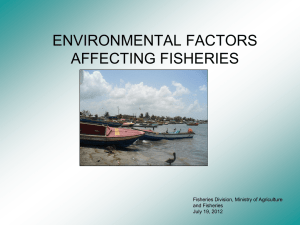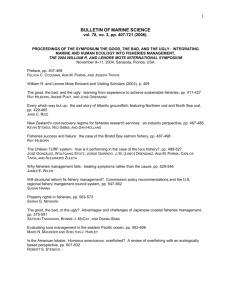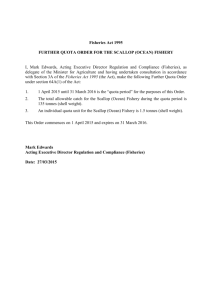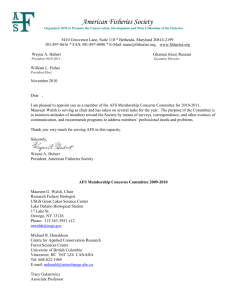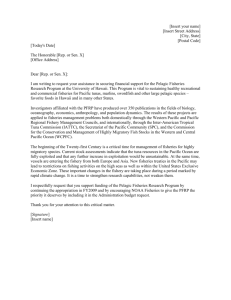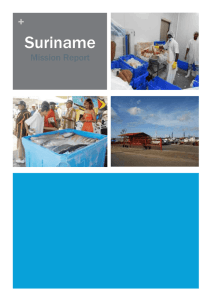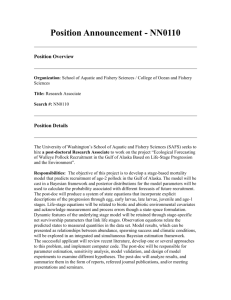Draft Proposal on Strengthening National and Regional sps
advertisement
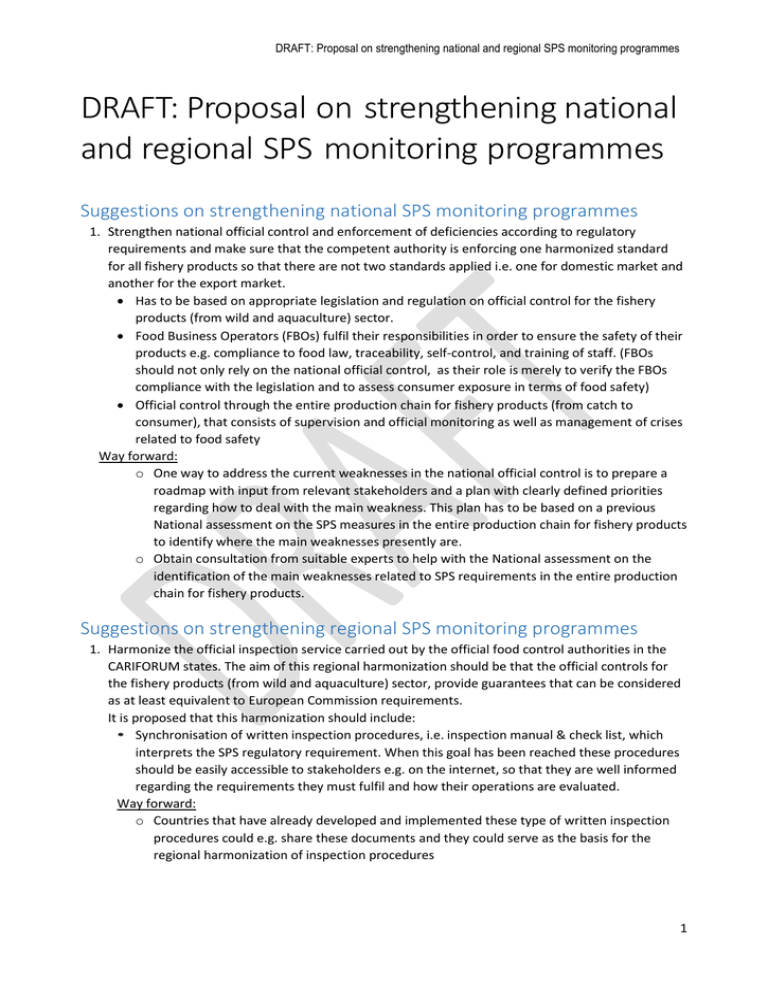
DRAFT: Proposal on strengthening national and regional SPS monitoring programmes DRAFT: Proposal on strengthening national and regional SPS monitoring programmes Suggestions on strengthening national SPS monitoring programmes 1. Strengthen national official control and enforcement of deficiencies according to regulatory requirements and make sure that the competent authority is enforcing one harmonized standard for all fishery products so that there are not two standards applied i.e. one for domestic market and another for the export market. Has to be based on appropriate legislation and regulation on official control for the fishery products (from wild and aquaculture) sector. Food Business Operators (FBOs) fulfil their responsibilities in order to ensure the safety of their products e.g. compliance to food law, traceability, self-control, and training of staff. (FBOs should not only rely on the national official control, as their role is merely to verify the FBOs compliance with the legislation and to assess consumer exposure in terms of food safety) Official control through the entire production chain for fishery products (from catch to consumer), that consists of supervision and official monitoring as well as management of crises related to food safety Way forward: o One way to address the current weaknesses in the national official control is to prepare a roadmap with input from relevant stakeholders and a plan with clearly defined priorities regarding how to deal with the main weakness. This plan has to be based on a previous National assessment on the SPS measures in the entire production chain for fishery products to identify where the main weaknesses presently are. o Obtain consultation from suitable experts to help with the National assessment on the identification of the main weaknesses related to SPS requirements in the entire production chain for fishery products. Suggestions on strengthening regional SPS monitoring programmes 1. Harmonize the official inspection service carried out by the official food control authorities in the CARIFORUM states. The aim of this regional harmonization should be that the official controls for the fishery products (from wild and aquaculture) sector, provide guarantees that can be considered as at least equivalent to European Commission requirements. It is proposed that this harmonization should include: • Synchronisation of written inspection procedures, i.e. inspection manual & check list, which interprets the SPS regulatory requirement. When this goal has been reached these procedures should be easily accessible to stakeholders e.g. on the internet, so that they are well informed regarding the requirements they must fulfil and how their operations are evaluated. Way forward: o Countries that have already developed and implemented these type of written inspection procedures could e.g. share these documents and they could serve as the basis for the regional harmonization of inspection procedures 1 DRAFT: Proposal on strengthening national and regional SPS monitoring programmes • Harmonize official monitoring and surveillance of fisheries product as well as of water and ice used in the production Way forward: o Countries that have already developed and implemented effective official monitoring and surveillance plans that cover the entire production chain for fisheries products could e.g. share these procedures. Some Caribbean countries have implemented these type of monitoring plans for fisheries products intended for export and these could be adapted and expanded to cover also fisheries products intended for the domestic market. o Obtain consultation from suitable experts regarding the main features of the risk based inspection of food business operators applied for the EU market. • Organise regional training of staff performing official controls • Regional audits to evaluate compliance according to the regionally harmonized inspection service, carried out by independent individuals with the capacity to conduct such audits. 2. Carried out an assessment to evaluate possibilities for integrated regional laboratories for the analysis of official control samples This assessment should e.g. comprise: Evaluation, including a cost-benefit analysis, on which laboratory analyses can be accredited and conducted nationally and which would be more beneficial to carry out regionally Which laboratory capacities are available in the CARIFORUM states Weaknesses in terms of necessary laboratory capacities in the region (e.g. equipment, availability of analytical expertise, accreditation and validation of the analytical procedures) and the cost related to building up these capacities in the Caribbean region Logistic related to transport of samples within the Caribbean region, the logistic aspects e.g. need to take into account; cost, time and reliability of the transport The assessment should also take into consideration which laboratory capacities could be shared between sectors e.g. in case the same analytical equipment and test procedures can be applied across sectors. 3. Monitoring and collection of data on contaminants/undesirable substances detected in fishery products from wild fisheries could be shared within the region as this type of monitoring covers all economically important marine species caught in Caribbean waters, hence this type of activity would benefit from a regionally coordinated approach. 4. Monitoring and collection of data on marine biotoxins like ciguatera toxin, PSP, DSP detected in in fishery products could be shared within the region as this type of monitoring data is essential for scientific risk assessment regarding the extent of this problem in the Caribbean regions. In addition, the CARIFORUM states should increase their research collaborations regarding ciguatera toxin in fisheries products and the type of dinoflagellates that may pose a risk to public health in increased research & development related to the fisheries sector, waters. 5. Improve the coordination of the different agencies within the region e.g. different organizations are collecting various types of data and should cooperate in the development of a comprehensive data and information exchange system that could be used to monitor, share information and knowledge and report on SPS practices. 2 DRAFT: Proposal on strengthening national and regional SPS monitoring programmes 6. Increase collaborations regarding training programs for persons working in the primary fisheries processing e.g. regarding general SPS requirements in fisheries and aquaculture sectors as well as the specific requirements of the EU and USA markets. Should start with an assessment of existing training programs in the region and best practise regarding reaching out and transferring knowledge to this target group. 7. Increase collaborations regarding consumer education to improve their understanding and perception regarding food safety of fishery products. Should start with an assessment of best practise regarding reaching out and transferring knowledge to this target group and whether different approach may be needed in different countries 8. Carried out an assessment to evaluate how technical expertise and research related to the fisheries and aquaculture sector could be increased to boost value addition and better use of marine resources in the CARIFORUM states This assessment should e.g. comprise: Which university programs are essential to boost value addition and better use of marine resources and how to address the weaknesses observed e.g. would it be necessary to build up new academic programs or revise existing ones Possibilities for building bridges between academia and private sector to increase their collaboration and define common goals regarding innovation and future developments of the fisheries and aquaculture sector Funding/ financing of research & development 3

